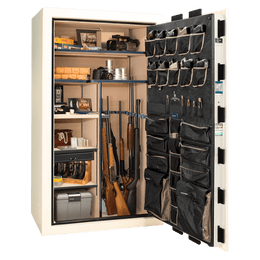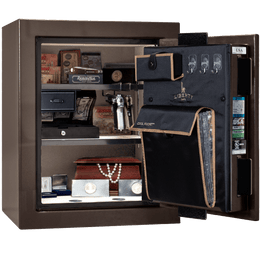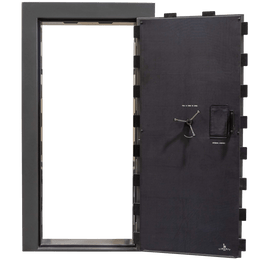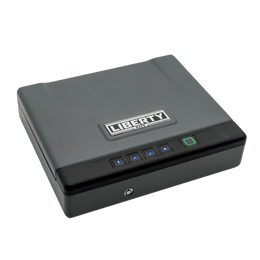A top-quality gun safe by Liberty is an excellent way to provide security and peace of mind for you and your family. Many people first consider purchasing a gun safe when they buy their first firearm, or perhaps when they acquire some valuables such as jewelry or precious metals.
In this series of articles, we’ll go over some things you may not think of storing in your safe or vault room, such as:
- Family albums and home movies/videos
- Medicines, drugs, pharmaceuticals
- Important personal vital records and legal documents
- Historical and genealogical records, books, journals, photos
- External hard drive backups and other valuable electronics
- Cleaning supplies and other potentially harmful chemicals
- Emergency food storage, medical packs, bug-out bags (maybe even some toilet paper…)
While these are certainly worthy of a place in your safe, there is a far longer list of items that you might consider including in your home safe or behind your safe door. In this series of articles, we’ll cover just a few of the types of valuables and items that can benefit from being securely locked up in a quality Liberty safe.
(Note: the basics of each category will be described below, but for the full details and more info, be sure to click the links and read the complete articles dealing with each category.)
Family albums and home videos/movies
Even with the latest trend to have all of our “pics” and videos backed up to “the cloud,” relying on a single method to keep your irreplaceable memories secure is not wise, particularly if that method is something over which you have no direct control.
Digital and cloud-based backup systems can and do fail, and even large tech companies have gone out of business and their customers have been left in the lurch. Now, we’re not saying you shouldn’t backup your digital images, videos, and data to the cloud or to local external hard-drive backup devices; quite the contrary. It’s a good idea to have multiple sources to back up your precious memories. However, keeping a hard copy and digital backups in your secure, fire-resistant safe is step one for peace of mind.
In addition, many older family albums, wedding albums, home videos, and even “home movies” (for those readers that have lived long enough to remember “Super 8” film cameras) are often not yet converted to digital versions, and losing an irreplaceable wedding album or collection of old family photographs can be absolutely devastating.
We’ll go over some of the options for converting your family albums and home movies/videos to digital versions (which can be more easily backed up) in our full article on storing family albums and home movies in your safe. But there’s something satisfying about having the original, tangible photographs and albums available to touch, look at, and share with family members. So consider storing these treasures in your safe after each use!
Medicines, drugs, pharmaceuticals
Should your home safe also serve as your secure medicine cabinet? It’s not a bad idea, particularly if you have painkillers such as opioids around. These compounds are potentially very harmful in the wrong hands, and can be extremely addictive. Keeping them locked securely in your safe is a basic safety precaution, and can prevent the temptation of family members or visitors to take them. (Sad to say, this is a primary source of opioid abuse.)
Additionally, keeping a supply of other vital medicines such as antibiotics and other life-saving drugs on hand can be a vital means of support in case of shortages, severe weather, social unrest, or other supply chain problems.
See our full article on storing medicines, drugs, and pharmaceuticals in your safe for more details.
Important personal records and legal documents
This one might not technically be a “thing you wouldn’t think to put in your safe,” because most reasonable people immediately recognize the value of keeping vital personal information, legal records, and other documents in a safe place, and what place in your home is safer than a secure, fire rated Liberty safe?
Some examples of important documents and records you should consider keeping in your safe include:
- Birth certificates
- Passports and passport cards
- Vaccine records
- Titles for automobiles, motorcycles, off-road vehicles, RVs, boats, etc.
- Deeds
- Social Security records
- Tax returns
- Receipts
- Warranties
- Life, home, car insurance policies
- Credit cards and bank account information
- Hunter’s safety cards
- Professional certifications/certificates
- Legal documentation, settlements
- Survey reports of property/real estate
- Any other important records you don’t want to risk losing
As we discuss further in our full article on storing personal and legal documents in your safe, you might consider adding an additional layer of fire protection for your documents in case of a truly catastrophic fire that burns for hours and hours without relief. Liberty offers Cool Pockets, which are fire-resistant document bags that take up almost zero room and add additional protection from fire, and you may also want to add a small “fireproof document safe” that you store inside your main safe, to keep irreplaceable paper items and records even more protected from extended fires.
Historical and genealogical records, journals, photos
Similarly to personal records and documents, you might also want to store your irreplaceable family histories, paper journals, photo albums, and genealogical records in your safe. While a lot of these items may take up quite a bit of room, consider the amount of work that went into creating them, and how you would feel if you were unable to recover them. (This is one reason why many people choose to keep multiple safes and/or build a secure, humidity-controlled room with a vault door.)
As we explain in our full article on storing historical and genealogical records, journals, and albums, you should absolutely have digital backups made of all your paper documents and family photos. There are multiple options for photographic, digital scanning, and OCR digital conversion of paper records, and you should take the time to have this service performed or do it yourself.
However, the hard copies are tangible, satisfying to hold and look at, and in many cases are essential to historical and genealogical research, and you should consider keeping these family treasures stored in a secure, fire-resistant safe or safe room, with additional layers of fire protection inside.
Some examples of these irreplaceable items might include:
- Paper journals
- Genealogical records, family trees, pedigree charts
- Photo and wedding albums
- Personal letters
- Vintage books
- Newspapers/clippings that have family importance
Hard drive data backups and other electronics
One disadvantage of living in an increasingly digital world, with “automatic” data storage and backup, is that fewer people are concerned about keeping local, redundant hard drive backups of their personal data, documents, images, and movies. Think about it: if you’re like the majority of people today, your phone is your primary camera and video recorder, as well as your calendar/personal daily planner, notepad, entertainment device, and more.
While the increasing spread of “cloud” backup systems has helped many people feel more at ease about potentially losing their irreplaceable photos, memories, documents, legal forms, etc., there are a lot of good reasons to supplement your online cloud backup with redundant hard drive backup devices stored in a quality, certified fire-resistant safe.
In our full article on storing backup hard drives and electronics in your safe, we’ll go over some important considerations when working toward keeping all your electronic (and physical) documents, photos, records, and memories safe from prying eyes and physical harm. We’ll also talk about the two main types of external hard drives (HDD and SSD) and discuss the potential benefits of RAID arrays.
Cleaning and sanitization supplies or other potentially harmful chemicals
You might not think about storing cleaning supplies or other chemicals in your safe, but it may make sense in some cases, for some users. Particularly families with small children or businesses that use caustic chemicals might consider keeping these supplies or items securely locked in a safe. There are some potential issues with this, depending on the chemicals in question and the other items you wish to keep in your safe or vault room. But for businesses in particular, keeping a dedicated safe or safe room with industrial chemicals may be the right choice, and for families, keeping cleaning and sanitization supplies in the only truly secure location in your home might be something to consider.
As we discuss in our full article on storing cleaning supplies and chemicals in your safe, the issue that can arise with some chemicals is “off-gassing” or vapors from caustic chemicals reacting with fumes from other chemicals or compounds, and creating corrosive or dangerous reactions. Storing anything valuable in the same vicinity as caustic chemicals is not a good idea, so if you decide you need to lock your cleaning supplies or chemicals in your safe, be sure to follow the chemical manufacturer’s recommendations for correct storage conditions, and be sure that any vapors or fumes from one chemical will play nice with the fumes from another chemical stored in the same location.
However, those of us who have lived through the crazy pandemic shortages on anything from chicken to pickles to dish soap will see the wisdom in keeping an emergency supply of Dawn, dishwasher pellets, rubbing alcohol, hydrogen peroxide, hand sanitizer, or similar items in a safe. They don’t take up much space, store practically forever, and can be a godsend when the stores have been picked clean.
Emergency food storage, medical packs, bug-out bags
In a situation where food, water, supplies, electricity (and maybe even toilet paper) are unavailable or in short supply, keeping a small emergency supply of food, water, and supplies in your safe might be appropriate. (Even better if you have a secure room with a vault door, which will allow for much more storage space.)
There are many sources of space-efficient emergency food sources to consider. It is probably not necessary to fill your safe with food, but a couple of days’ worth will be a hedge against the unknown and will last for years stored in your cool, dry safe.
Water is likely to be a more pressing need if it comes to the point of you relying on your safe-stored supply. A 3-day supply of water for however many people you wish to provide for is a reasonable idea, as are water purification tablets or “straws” which allow you to purify or filter water from locally available sources.
Should you consider storing toilet paper in your safe? Maybe… if you remember what it was like when every store shelf was bare. A packet of moist flushable wipes can feel more valuable than gold when there’s no hope of buying toilet paper, and doesn’t take up much space in your safe, either.
A compact medical bag is a good idea to store along with your other emergency supplies if you choose to keep them in your safe. If your situation is so dire as to need your absolute last-resort emergency backup supply of food and water, that probably means your primary supply in your home is not available for whatever reason, and there’s a good chance you’ll benefit from a medical kit and “bug-out bag” as well.
Remember, these are options to consider for the very outside of possibility, but it can add peace of mind. For situations like this, a safe door or vault room allows for much greater capacity.







